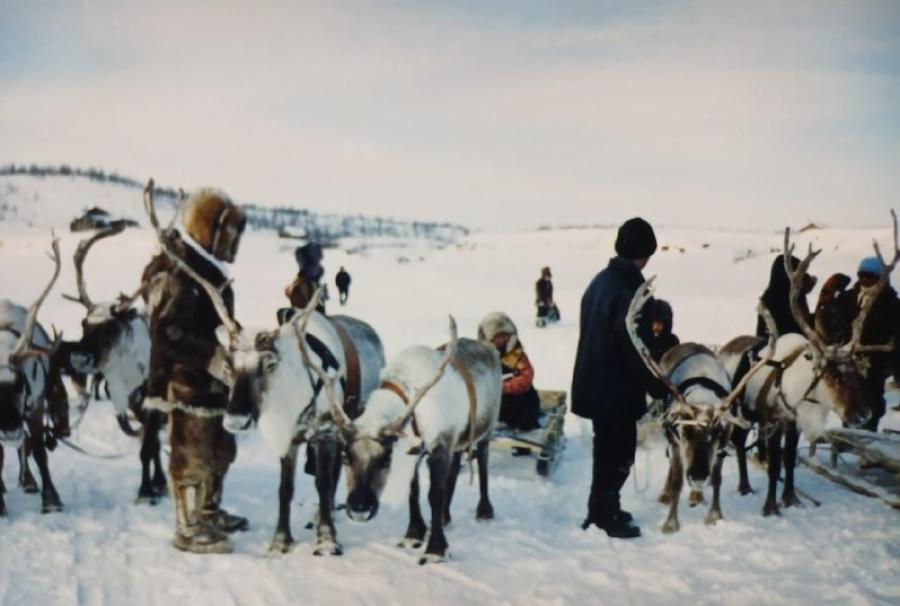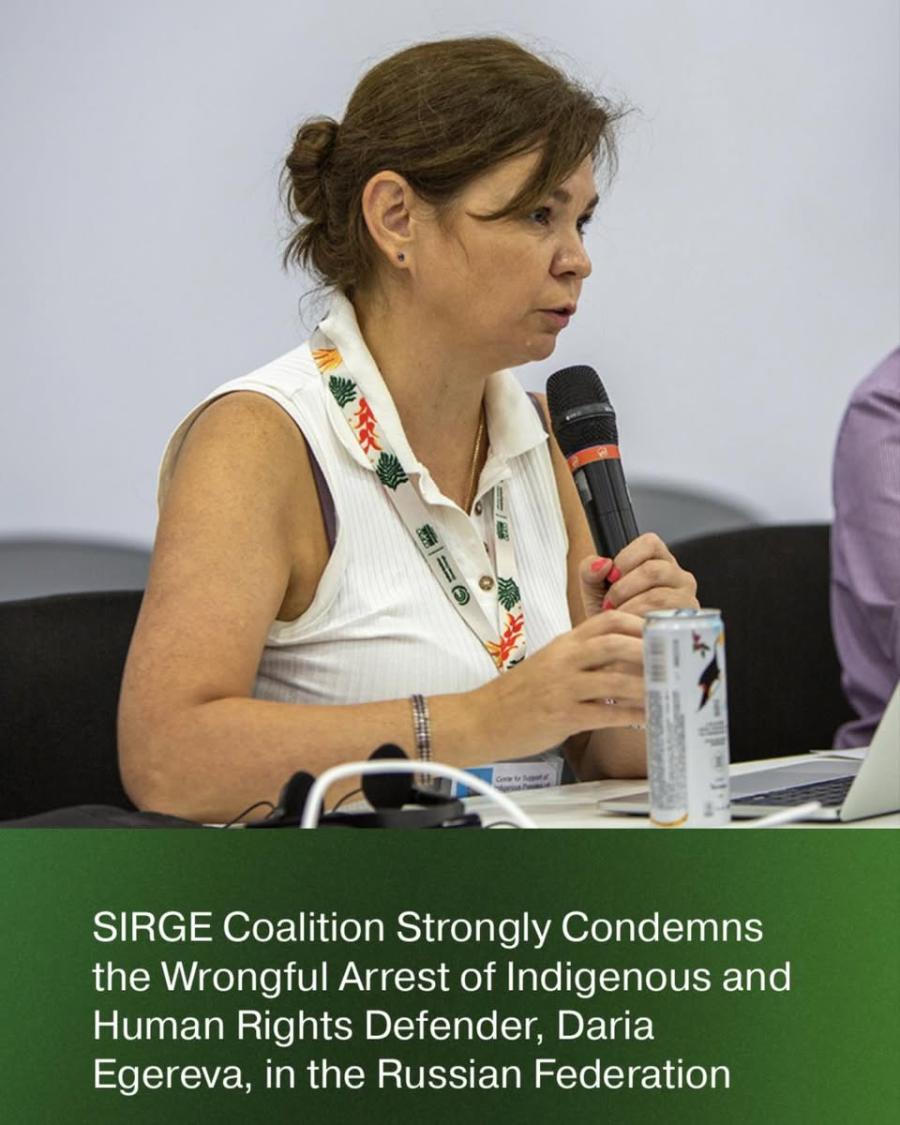Driven even deeper into the Eastern Sayan Mountains by invading Turks in the seventh century. Mongolas in the thirteenth century, and Russians in the seventeenth century, the Tofa ended up in territory that is exceedingly difficult to reach. Not a single road extends into Tofalaria, the land of the Tofa. The rivers flowing out of the mountains are so rough that it's impossible to enter the region by water or ice. The journey through the mountains and swamps, grown over in virgin taiga and fallen trees, is long and arduous. It's really only possible to reach Tofalaria on foot or by helicopter or small plane.
Encompassing only about 10,000 square miles, Tofalaria is also one of the wettest places in the former Soviet Union, receiving up to 78 inches of precipitation per year. Rain and fog often make flying impossible. Frosts end late in June and begin in August.
These factors isolate Tofalaria and explain why the Tofa, one of the smallest cultures of Russia, could preserve a distinctive and ancient society. The Tofa livelihood of hunting and gathering has changed little over thousands of years. And the Tofa still engage in primitive herding, using only half-wild reindeer, a few horses and, recently, several dozen cows.
Today, about 1,100 people live in Tofalaria, among them about 600 Tofa. Yet the culture of every people is a treasure; that of the Tofa is doubly valuable since it retains elements of the lives of hunters and gatheres in the distant past.
NO WARS OR WARRIORS
Despite their isolation, the Tofa didn't degenerate from the intermarriage unavoidable in a small population. They were divided into nine clans - only five survive - and a man could marry a woman from any clan except his own. This helped preserve the health of the population. Extramarital relations played a role as well: a woman would could engage in sexual relations with strangers, and children at the time of marriage gave her an advantage over others. A mother could even have "night-time friends" from outside the clan.
Reindeer were prized possessions around which people built their daily lives. Following the seasons, the Tofa migrated continuously with five to seven, and occasionally up to twenty reindeer. They transported their few household belongings, loaded on wooden cargo saddles on the backs of reindeer. Even small children rode on the reindeer in cradles on special saddles.
In summer, the Tofa ascended to patches of snow in the mountains to escape gadflies, the enemy of reindeer. In the fall, they descended to the valleys for hunting. In winter, the men left the family to go hunting; women and children migrated alone or in small groups. Hunters went into the taiga for months, usually alone, where winds raged and temperatures dropped to - 50°C. The hunters lacked even temporary shelters. Day after day, they moved about in ravines, spending the night under the open sky. Families depended on the success to the hunt, but they never stored away reserves and consequently starved when the hunt was poor.
To outsiders, such a daily life and customs have long sparked uncertainty and accusations that the Tofa are lazy. Russian hunters, who occasionally climbed into the taiga, were amazed by how few households implements Tofa had. Several years ago, a high-ranking bureaucrat asked the members of an expedition I was on. "What did you find interesting in these Tofa? After all, they were driven into those mountains by the Tuvans for laziness and stupidity."
On another expedition, in a cave in northern Tofalaria, I found a document by a Russian writer in 1725. This is the oldest written source describing the life of these nomadic hunters. At the head of each clan stood an elected chief or "darga," and all the people elected a supreme chief or "Ulug-Pash." The darga resolved conflicts in a clan and strove to ensure that families who lost a parent survived. He could prompt clansmen to designate an adolescent male from another family to take the place of the provider or a young woman to take the place of a mother. The darga monitored the distribution of meat and fish, dividing them equally among the members of the clan. Hides went to the families most in need of sheeting for the choom (tepee) the Tofa lives in. The darga also made sure that old people weren't left destitute.
The Ulig-Pash settled conflicts among clans, granted permission for marriages, and strove to ensure that every family collected and delivered the "alban," a tax Russia imposed in 1649. The Tofa had to pay the tax in the form of sable pelts once a year, in return receiving gun powder, lead, and other essential goods.
All this took place during a yearly meeting-holiday called the "suglan." Throughout the year, the Tofa moved about in small groups or alone, so the suglan was much-awaited. The Tofa danced and sang around a sacred fire. There was competition in such sports as archery, lifting heavy rocks, and reindeer riding. There were games for everyone and fairy tales for children. The Tofa sang "ulgers," musical poems of wisdom, laconic and perfect in form. One could even drink vodka, then a rarity in the taiga.
The chief's and elders assembled in the Great Choom, but they never voted on important matters. The Tofa accepted only decisions that everyone agreed upon, arguing until they reached a consensus. It was valorous to make concessions, and concession in an major dispute was particularly praiseworthy.
The supreme chief unilaterally handed down a decision only for misdeeds. Usually the wrongdoer had to pay the victim a fine. In special cases, the guilty party received several lashes with willow twigs. The worst punishment was when the Ulug-Pash stood next to the public fire, pointed at the wrongdoer, and proclaimed, "Everyone look at him, he is a bad person!"
Tofa society rejected violence. It's no accident that wrestling was never among the competitions at the suglan. Crowed from all sides Buryats, Tuvans, and Russian settlers, the Tofa receded to the inaccessible mountains, offering no resistance. Even their folklore contains no accounts of war, warriors, or epic heros.
The Tofa believed that all objects and happenings are alive. For example, trees have a distinctive humans. Tofa brought gifts to induce the tree-shamans to intercede before the local lard-spirit who gave success in hunting. They believed that animate rocks could crush a bad person or permit a good person to pass through the mountains safety. After s successful kill, a 30-year-old hunter once forced me to throw our next-to-the-last cartridge into a crack between rocks as an offering to the god who gave the catch. He hotly explained that failing to thank the god is far worse than being without cartridges.
A DIFFERENT MENTALITY
Even before our era, people who spoke Samoyed and Kett came into tofalaria. After that came Turkish and Mongolian speakers. Elements of each of these languages persist in the language spoken by elder Tofa, as does a considerable vocabulary from an unknown ancient language. Yet none of these cultural influences could change the taiga. It is assumed the Turks taught the Tofa to ride reindeer, but that didn't alter the basis of a livelihood in the mountains. Limited reserves of food for the reindeer didn't permit herds to grow much, and the climate didn't permit farming. Even if a person wanted to herd more reindeer or carry extra food, the increased difficulties of travel would make such a lifestyle impossible.
Thus, nature explains the paradoxes of the Tofa. Although they absorbed language and habits from new arrivals, the Tofa remained hunters and gatherers. The taiga can provide food, shelter, warmth, and health for only a limited number of people.
During thousands of years living in these conditions, the Tofa developed a mentality that is, at its root, different from that of European culture. As a result, collisions between the culture of the Russians (especially the Soviet variant) and the culture of the Tofa has been deadly for this small people. In the 1930s, for example, during collectivization, the Tofa were forced to settle in three villages and adopt a sedentary lifestyle. Wooden huts, hastily built by Russians, have long needed repaired. Life in them is uncomfortable; children have frozen to death in them. Yet the Tofa don't even think about repairs. Their thoughts are directed entirely towards leaving the settlements and getting back to hunting or reindeer herding in the taiga.
Every Tofa family used to milk reindeer cows, improving its diet and saving children and sick people from many diseases. But under Soviet management reindeer in collective herds were milked excessively for state use, depriving families of this milk and harming the reindeer. After removing the reindeer from the care of the Toda, Soviet administrators failed to ensure proper care and breeding. The reindeer have degenerated from inbreeding and thinned out due to disease. Because Tofa can't hunt without reindeer, the disappearance of the reindeer could lead to the disappearance of the Tofa.
Soviet power, having limited the freedom of the Tofa and taken away their reindeer, made vodka accessible in exchange. The Tofa, almost to the last one, are becoming alcoholics. According to the records of a stores in one settlement, 67 percent of the tunrover consists of alcohol.
A rift between the older and younger generations is appearing. The ancient oral culture of the Tofa - their songs, verse, and legends - is dying. Young Tofa complete school having been deprived of their native language. Having received a poor education and with no chance to learn traditional activities, they can't find work. They loiter in the settlements, squandering the meager earnings of the older generation on alcohol. The old people, hunters and reindeer herders, die with no one to replace them. Everyone sees that the old customs, language, culture, way of life are held in contempt by strong newcomers.
The Tofa's ability to live in the mountainous Siberian taiga hasn't given them the ability to survive their collision with the indifference of the modern world. Most Tofa who have left Tofalaria, even those who received special training, return to recount with horror the time they spent away from the taiga and their traditional way of life. But Tofalaria is one of the last patches of untouched taiga, leaving the Tofa nowhere left to escape any farther.
Article copyright Cultural Survival, Inc.



